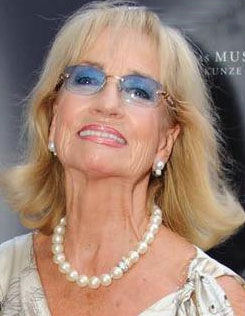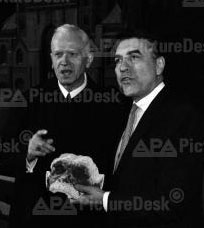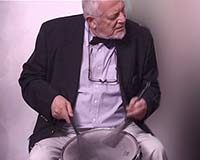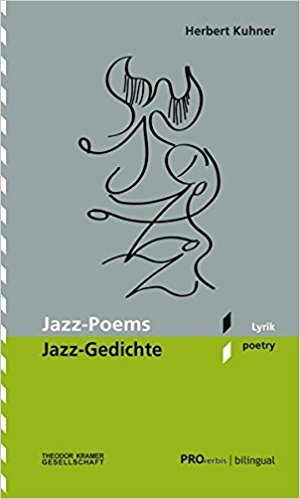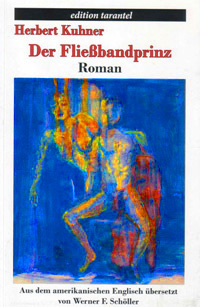The End of Fritz
“We will gag the impudent Jewish mouth.”
– Josef Goebbels
I discovered Kafka, Schnitzler and Zweig in my teens in the Fifties. These great writers took their place among the American, English and French writers that I was reading. As I was relearning German, I read more and more Austrian writers. I read German writers too, but the Austrians were my favorites.
I read their work, but I also read about their lives. That meant reading about tragic circumstances.
When I returned to Austria, I could not avoid being confronted with the reality of the past.
Egon Friedell sprang to his death from the balcony of a house across the street in Gentzgasse, where I live. I pass the spot every day.
Kafka and Schnitzler died before the Third Reich became a reality. Zweig lived to see that but couldn’t bear the reality of it and  ended his life due to it. A while back I read about Fritz Grünbaum’s fate. I have seen old films of Fritz’s cabaret routines. They are a pleasure for the eyes and ears – and life affirming! Fritz was small and bald, but he had oodles of charm. He was simply a delight. He caught on immediately. Fritz had quite a life! He was a man everyone liked – except anti-Semites.
ended his life due to it. A while back I read about Fritz Grünbaum’s fate. I have seen old films of Fritz’s cabaret routines. They are a pleasure for the eyes and ears – and life affirming! Fritz was small and bald, but he had oodles of charm. He was simply a delight. He caught on immediately. Fritz had quite a life! He was a man everyone liked – except anti-Semites.
Fritz however was no softie. During a cabaret number in 1907, when an officer of the K-and- K army made an anti-Semitic remark, Fritz left the stage, went up to the officer and slapped him in the face. He was challenged to a duel in which he was wounded. That incident presaged things to come when there would be no opportunity for defense.
In 1938 Fritz did not manage to emigrate. He had spoofed the Nazis, and they had him on their list. When they marched in, he tried to flee to Czechoslovakia with his wife, but they were sent back at the border. It didn’t take long for the Gestapo to get him.
Life was fine for many Jews in Austria before March of that year. It was fine for my family too, but during that month life turned into Hell. We got out in July of 1939. And for those who did not get out, Hell only ended with death.
I have to say this. The orders came from above and were unmerciful. But those who carried them out often didn’t need orders. They killed and tormented at random. And their means were “creative.” They thought up the most barbarous and painful manner of torture and murder.
Here is what the SS did to Fritz: He was forced to lie on the floor and ordered to stick his tongue out while all those present wiped their boots on his mouth.
This was of course symbolic. That tongue and larynx had mocked Hitler and his Gang.
Fritz was shown no mercy. He was not killed on the spot. There was more excruciating suffering in store for him before his death. The utmost cruelty reserved for those whose opposition was public.
I have to say this. The orders came from above and were unmerciful. But those who carried them out often didn’t need orders. They killed and tormented at random. And their means were “creative.” They thought up the most barbarous and painful manner of torture and murder.
I say that the guilt of this deed can never be expunged. If there is a Hell and the monsters who committed it are in it, no Hell could ever cause more suffering Fritz Grünbaum underwent. And he was not the only one. He was one of multitudes
If there is a Paradise, an eternity of bliss could not make up for the suffering caused by such monstrous deeds.
There’s nothing more to say.
Das Ende von Fritz Grünbaum
„Einmal wird unsere Geduld zu Ende sein, und dann wird den Juden das freche
Lügenmaul gestopft werden.“
– Josef Goebbels
Ich entdeckte Kafka, Schnitzler und Zweig als Jugendlicher in den Fünfzigern in Trenton. Diese großen Schriftsteller habe ich genauso wie die großen amerikanischen, englischen und französischen sehr gern gelesen. Als ich in Amerika wieder Deutsch gelernt habe, habe ich mehr und mehr österreichische Autoren gelesen. Ich habe auch die Werke deutscher Schriftsteller gelesen, aber die österreichischen habe ich am liebsten gelesen.
Ich las ihre Werke, aber auch über ihr Leben – das hieß in erster Linie, auch von tragischen Umständen zu lesen.
Als ich nach Österreich zurückgekehrt war, habe ich die Konfrontation mit der Vergangenheit nicht vermeiden können. Sie war immer präsent.
1938, als die SA kam, ist Egon Friedell vom Balkon seiner Wohnung, die meiner heutigen gegenüberliegt, in den Tod gesprungen. Ich gehe jeden Tag an dieser Stelle vorbei.
Kafka und Schnitzler sind gestorben, bevor das Dritte Reich Realität geworden ist. Zweig ist ausgewandert, hat aber diese Realität nicht ertragen können: Er und seine Frau haben sich in der argentinischen Emigration das Leben genommen.

Fritz Grünbaum
Fritz Grünbaum war klein und kahlköpfig, aber er hatte eine Unmenge an Charme und bereitete Freude. Ich habe alte Filme mit Fritz Grünbaum als Kabarettisten gesehen. Sie sind ein Vergnügen für Augen und Ohren – und sie sind lebensbejahend. Der Erfolg ließ nicht lange auf sich warten. Er war ein Mann, den jeder gerngehabt hat, ausgenommen Antisemiten.
Fritz war kein Weichling. 1907, während eine Kabarettnummer, hat ein K. u. K.- Offizier Fritz mit mit antisemitischen Sprüchen beleidigt, worauf er von der Bühne gestiegen ist und den Offizier abgewatscht hat. Es folgte ein Duell, bei dem Fritz verwundet worden ist. In der Zukunft lagen Tage und Jahre ohne Verteidigungsmöglichkeiten.
Er war 1938 in Wien, als Österreich zur Ostmark geworden ist. Bis dahin hatte Fritz ein tolles Leben, aber das war jetzt für immer vorbei.
Vor dem März 1938 war das Leben in Österreich für viele Juden angenehm – auch für meine Familie. Alles hat sich über Nacht geändert. Auf einmal war es die Hölle. Meine Eltern verließen 1939 die Ostmark. Für die, die nicht auswandern wollten oder konnten, führte diese Hölle in den Tod.
Fritz hat sich über die Nazis lustig gemacht und stand daher ganz oben auf ihrer Liste. Er hat noch versucht, mit seiner Frau in die Tschechoslowakei zu flüchten, aber die beiden sind an der Grenze zurückgeschickt worden.
Die Gestapo hat ihn schnell geschnappt.
Ich muß es sagen: Die Befehle kamen von oben und waren unbarmherzig. Aber jene, die sie ausführten, brauchten oft gar keine Befehle. Sie töteten und folterten selbständig, und ihre Methoden waren oft „kreativ“.
Für Fritz gab es kein Erbarmen. Er wurde nicht sofort getötet – vor seinem Tod hat er noch qualvoll zu leiden gehabt. Die äußerste Grausamkeit gab es für jene, die ihre Gegnerschaft öffentlich zeigten.
Die SS zwang Fritz Grünbaum, sich auf den Boden zu legen, er mußte seine Zunge herausstrecken, und alle wischten ihre Stiefel daran ab.
Dies war symbolisch – diese Zunge hatte Hitler und seine Bande verspottet.
Wenn es die Hölle gibt und sich die Monstren von damals dort aufhalten, so kann doch keine Hölle das Leiden übertreffen, das Fritz ertragen mußte.
Ich meine, daß die Schuld für solche Taten nie gesühnt werden kann. Und er war nicht der einzige, er war einer von vielen. Und wenn es das Paradies gibt, so kann nicht einmal ewige Seligkeit ein Ausgleich für solche Leiden sein.
Mehr gibt es nicht zu sagen.
Fritz Löhner-Beda
from „En Route with Herbert Kuhner“ Film by Fritz Kleibel
Fritz und die Bananen
Du hast das Lied
hundertmal gehört:
Ausgerechnet Bananen.
Kannst du dir die Zwanzigerjahre vorstellen
ohne Bananen?
Die gehören dazu
wie der Jazz
und der Bubikopf.
Frank Silver schrieb die Musik
und Irving Cohn den Liedtext.
Die deutsche Fassung
kam aus der Feder
eines österreichischen Multitalents,
das so wienerisch war,
wie man wienerischer nicht sein kann.
Fritz Löhner-Beda
war nie um einen Text verlegen.
Bananen schüttelte er 1923
aus dem Ärmel.
Er schrieb auch das Libretto für
Lehárs Land des Lächelns.
Fritz war zuversichtlich
und konnte nicht glauben,
dass sich alles so entwickeln würde,
wie es dann tatsächlich kam,
als Österreich 1938 zur Ostmark wurde.
Immerhin, überall wo er ging,
hörte er seine Liedertexte
gesungen oder gesummt.
Doch Fritz hat die Lage
falsch eingeschätzt.
Er ist mit dem ersten Transport
nach Dachau gekommen.
Als er nach Buchenwald verlegt wurde,
setzte sich seine Karriere
hinter Stacheldraht fort.
Zusammen mit Hermann Leopoldi
schrieb er das Buchenwald-Lied.
Dieses Lied ist entstanden
auf Befehl des Kommandanten
und ist von den Insassen
bei ihrer Sklavenarbeit gesungen worden.
Leopoldis Familie und Freunde
haben ihn ,rausgekauft’,
und er ging nach New York,
wo er seine Lieder
in Emigrantencafés spielte und sang.
Fritz aber blieb, wo er war,
ohne die Hoffnung aufzugeben.
Immerhin würde sein Freund und Kollege
Franz Lehár sich für ihn einsetzen.
Das Land des Lächelns
war die Festaufführung
an der Wiener Staatsoper zur Feier
von Lehárs siebzigstem Geburtstag
im April 1940.
Und Fritz wartete.
Lehár wurde gefeiert,
aber sein Librettist
fehlte auf den Plakaten
und im Programm.
Fritz hat vergeblich gewartet
in Buchenwald.
Später ist er verlegt worden –
nach Auschwitz.
Als der Zug dort ankam,
hörte er sein Lied
Oh, Donna Clara.
Das Lagerorchester
spielte diesen melancholischen Tango,
um die Neuankömmlinge
„willkommen zu heißen”.
Donna Clara war zur „Kennmelodie”
von Auschwitz geworden.
Die Lieder von Fritz Beda
sind ihm gefolgt,
wo immer er hinging.
Im Dezember 1942
ist Donna Clara
sein Abschiedslied geworden.

Donna Clara
When lovers become lovers,
there’s always a song
that acts as a musical background
and becomes their song.
When they hear it
years later,
it gives them a feeling
of nostalgia and longing
There’s a beautiful song
that became such a song
for lovers
Oh, Donna Clara
is a song of 1930
that provided joy for many,
and it did so innocently
for a decade.
The composer is a Pole,
whose name is a tongue twister
for those who speak English.
The German lyrics are by Fritz Beda,
an Austrian librettist and poet,
who shook them out of his sleeve.
The lyrics for Yes, We Have No Bananas
also came from that prolific sleeve.
After a decade, Donna Clara
was abused and ruined.
That doleful melancholy melody
became the musical logo
for the end of the line
in Poland till the mid-Forties.
The inmate orchestra played it
for the new arrivals.
It was what they heard –
among other sounds –
when boxcar doors
were flung open.
Fritz Beda did not know,
when he wrote the lyrics,
that he was writing
his own death dirge,
as well as a dirge for others.
The strains of Oh, Donna Clara
were the concluding music
for multitudes.
Donna Clara was used
as the theme song of Auschwitz.
It is a tune that will hound anyone
whose life was not expunged
at that location
till the end of his days.
Much art and literature
was destroyed in the Third Reich.
Donna Clara as a tune survived.
It is still played
and is as enchanting as ever –
for some –
others cannot bear to hear it.
Through no fault of its creators
or its interpreters,
Oh, Donna Clara
has been stained forever.
Oh, Donna Clara (Tango Milonga)
Music by Jerzy Petersburski
Original German Lyrics by Fritz Beda-Löhner
English Lyrics by Irving Caesar
Donna Clara
Wenn zwei sich verlieben,
gibt es immer ein Lied
als musikalischen Hintergrund,
und das wird dann zu „ihrem” Lied.
Wenn sie es hören,
Jahre später,
kommt die Erinnerung
und die Sehnsucht.
Es gibt ein schönes Lied,
das solch ein Lied
für Verliebte wurde.
Oh, Donna Clara,
ein Lied von 1930,
hat vielen Freude gemacht
für ein Jahrzehnt.
Der Komponist ein Pole,
sein Name ein Zungenbrecher.
Deutscher Text von Fritz Beda,
einem österreichischen Librettisten und Dichter,
der auch für Ausgerechnet Bananen
verantwortlich war.
Ein Jahrzehnt später
war Donna Clara missbraucht und ruiniert.
Jene traurig-melancholische Weise
war zum musikalischen Logo geworden,
am Ende der Reise in Polen,
bis in die Mitte der Vierzigerjahre.
Das Lagerorchester spielte das Lied
für die Neuankömmlinge.
Das hörten sie –
nebst anderen Tönen –
wenn die Viehwaggons geöffnet wurden.
Als Fritz Beda den Text schrieb,
ahnte er nicht, dass er ein Totenlied verfasst hatte,
für sich und andere.
Die Weise von Oh, Donna Clara
war für Unzählige der Schlussakkord.
Donna Clara ist
die Kennmelodie von Auschwitz geworden.
Diese Melodie wird jeden,
dessen Leben nicht ausgelöscht wurde
an diesem Ort,
verfolgen bis ans Ende seiner Tage.
Vieles an Kunst wurde zerstört
im Dritten Reich,
Donna Clara hat überlebt
und wird noch immer gespielt
und ist so bezaubernd wie eh und je –
für einige –
andere können es nicht ertragen.
Oh, Donna Clara ist auf ewig –
ohne Schuld seiner Schöpfer oder Interpreten –
gebrandmarkt.
Oh, Donna Clara (Tango Milonga)
Musik von Jerzy Petersburski
Original deutscher Text von Fritz Beda-Löhner
Englischer Text von Irving Caesar
-Herbert Kuhner
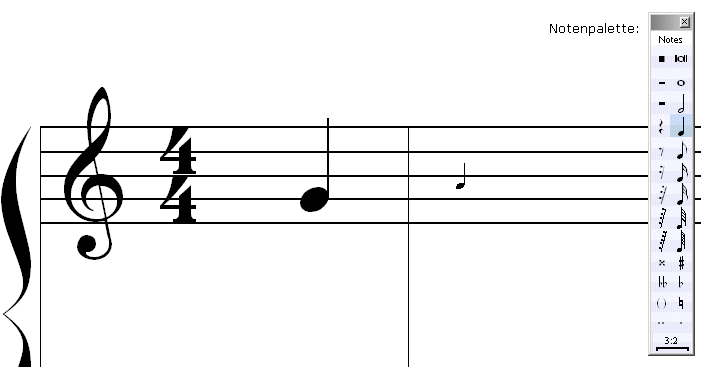
1930 gab Petersburski mit seinem Orchester ein Konzert in Wien, bei dem er unter anderem seine Tango Milonga aufführte. Daraufhin erwarb der Wiener Bohême Verlag die Aufführungsrechte mit der Vereinbarung, dass der Titel geändert werden darf, und beauftragte Fritz Löhner-Beda mit der Erstellung eines deutschen Textes. Unter seinem Titel Oh, Donna Clara wurde das Stück danach weltweit bekannt. Bereits am 31. März 1930 wurde das Stück unter dem neuen Titel durch das Jazz-Orchester John Morris mit Alfred Behrens als Sänger auf Schallplatte eingespielt. Eine englische Version erschien im November 1930 in London, gesungen von Georges Metaxa mit Ray Noble & his New Mayfair Orchestra; der englische Text von Irving Caesar und Jimmy Kennedy folgte weitgehend dem deutschen. (Quelle:Wikipedia)
 see (and listen to) „Padhi on Günter Brus“: click here
see (and listen to) „Padhi on Günter Brus“: click here










 Users Today : 16
Users Today : 16 Users Yesterday : 156
Users Yesterday : 156 This Month : 1883
This Month : 1883 This Year : 9260
This Year : 9260 Total Users : 230396
Total Users : 230396 Views Today : 24
Views Today : 24 Total views : 1966867
Total views : 1966867 Who's Online : 1
Who's Online : 1


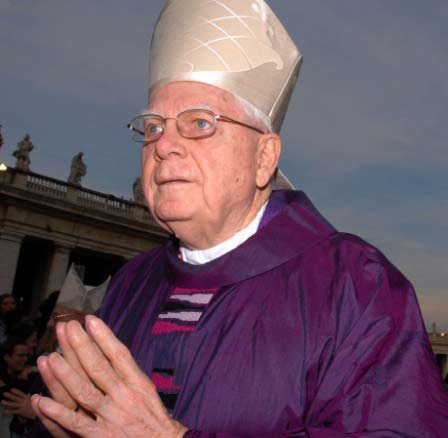
 Allegations that Maciel had raped young seminarians were brought by the victims to the Vatican in the 1990s, but under apparent orders from John Paul’s No. 2, a canonical trial was shelved. Maciel’s primary protector Cardinal Angelo Sodano, Dean of the College of Cardinals and former Vatican Secretary of State. Sodano assails gossipers: “The people of God are with you and do not allow themselves to be impressed by the petty gossip of the moment, by the trials that sometimes assail the community of believers.”[7]
Allegations that Maciel had raped young seminarians were brought by the victims to the Vatican in the 1990s, but under apparent orders from John Paul’s No. 2, a canonical trial was shelved. Maciel’s primary protector Cardinal Angelo Sodano, Dean of the College of Cardinals and former Vatican Secretary of State. Sodano assails gossipers: “The people of God are with you and do not allow themselves to be impressed by the petty gossip of the moment, by the trials that sometimes assail the community of believers.”[7]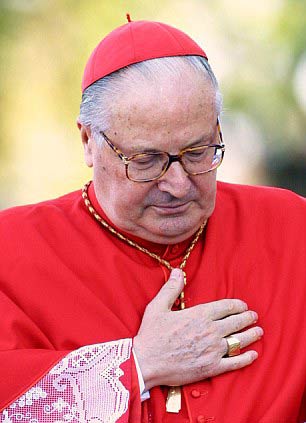
 ended his life due to it. A while back I read about Fritz Grünbaum’s fate. I have seen old films of Fritz’s cabaret routines. They are a pleasure for the eyes and ears – and life affirming! Fritz was small and bald, but he had oodles of charm. He was simply a delight. He caught on immediately. Fritz had quite a life! He was a man everyone liked – except anti-Semites.
ended his life due to it. A while back I read about Fritz Grünbaum’s fate. I have seen old films of Fritz’s cabaret routines. They are a pleasure for the eyes and ears – and life affirming! Fritz was small and bald, but he had oodles of charm. He was simply a delight. He caught on immediately. Fritz had quite a life! He was a man everyone liked – except anti-Semites.


